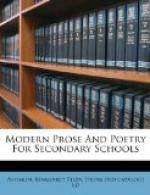For a coon hates snow. He will invariably sleep off the first light snowfalls, and even in the late winter he will not venture forth in fresh snow unless driven by hunger or some other dire need. Perhaps, like a cat or a hen, he dislikes the wetting of his feet. Or it may be that the soft snow makes bad hunting—for him. The truth is, T believe, that such a snow makes too good hunting for the dogs and the gunner. The new snow tells too clear a story. His home is no inaccessible den among the ledges; only a hollow in some ancient oak or tupelo. Once within, he is safe from the dogs; but the long fierce fight for life taught him generations ago that the nest-tree is a fatal trap when behind the dogs come the axe and the gun. So he has grown wary and enduring. He waits until the snow grows crusty, when, without sign, and almost without scent, he can slip forth among the long shadows and prowl to the edge of dawn.
Skirting the stream out toward the higher back woods, I chanced to spy a bunch of snow in one of the great sour gums, that I thought was an old nest. A second look showed me tiny green leaves, then white berries, then mistletoe.
It was not a surprise, for I had found it here before,—a long, long time before. It was back in my school-boy days, back beyond those twenty years, that I first stood here under the mistletoe and had my first romance. There was no chandelier, no pretty girl, in that romance,—only a boy, the mistletoe, the giant trees, and the somber, silent swamp. Then there was his discovery, the thrill of deep delight, and the wonder of his knowledge of the strange unnatural plant! All plants had been plants to him until, one day, he read the life of the mistletoe. But that was English mistletoe; so the boy’s wonder world of plant life was still as far away as Mars, when, rambling alone through the swamp along the creek, he stopped under a big curious bunch of green, high up in one of the gums, and—made his first discovery.
So the boy climbed up again this Christmas Day at the peril of his precious neck, and brought down a bit of that old romance.
I followed the stream along through the swamp to the open meadows, and then on under the steep wooded hillside that ran up to the higher land of corn and melon fields. Here at the foot of the slope the winter sun lay warm, and here in the sheltered briery border I came upon the Christmas birds.
There was a great variety of them, feeding and preening and chirping in the vines. The tangle was a-twitter with their quiet, cheery talk. Such a medley of notes you could not hear at any other season outside a city bird store. How far the different species understood one another I should like to know, and whether the hum of voices meant sociability to them, as it certainly meant to me. Doubtless the first cause of their flocking here was the sheltered warmth and the great numbers of berry-laden bushes, for there was no lack either of abundance or variety on the Christmas table.




